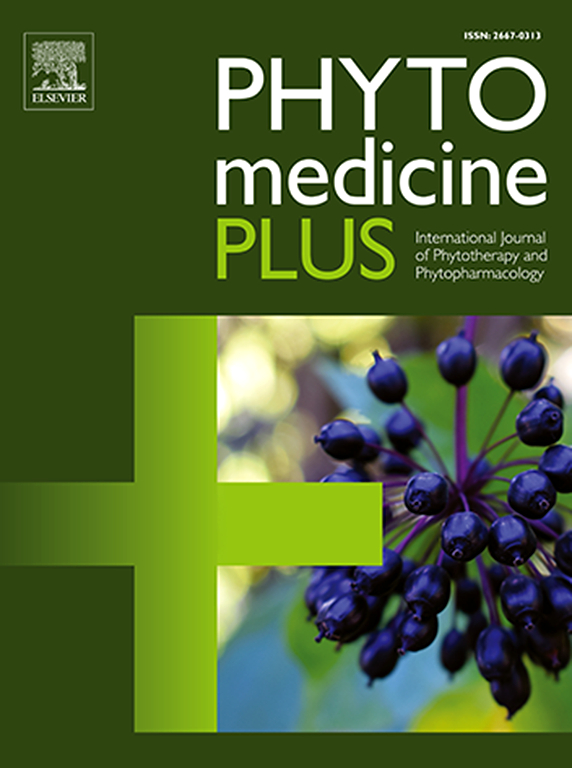Comprehensive insights into the therapeutic effects of baicalein and baicalin against SARS-COV-2 infection
Q3 Pharmacology, Toxicology and Pharmaceutics
引用次数: 0
Abstract
Background
The coronavirus disease 2019 (COVID-19) pandemic is caused by severe acute respiratory syndrome coronavirus 2 (SARS-CoV-2). The emergence of new SARS-CoV-2 variants has reduced the effectiveness of existing vaccines. Current treatments, including corticosteroids, antiviral agents, and monoclonal antibody-based immunomodulators, often have limitations, including adverse side effects, limited efficacy, and high costs, especially for patients with comorbidities. These challenges have spurred interest in phytochemicals, known for their anti-inflammatory, antiviral, and antioxidant properties.
Purpose
This review aims to provide a comprehensive analysis of the anti-SARS-CoV-2 efficacy and anti-inflammatory activity of baicalein and its 7-O-glucuronide derivative, baicalin, are the main components derived from Scutellaria baicalensis. We focus on their mechanisms of action against SARS-CoV-2 and their potential role in mitigating COVID-19-related inflammation.
Materials and Methods
A comprehensive literature search was conducted using databases such as PubMed, Web of Science, and Scopus. Studies investigating the effects of baicalein and baicalin on viral infections, inflammatory pathways, and COVID-19-specific targets, including spike protein, 3C-like protease (3CLpro) and PLpro, were included.
Results
Baicalein and baicalin exhibit anti-SARS-CoV-2 activity by inhibiting viral entry through blockade of the interaction between the spike protein and angiotensin-converting enzyme II (ACE2) receptor. They also suppress viral replication by targeting 3CLpro, RNA-dependent RNA polymerase (RdRp), and helicase. Moreover, baicalein and baicalin mitigate COVID-19-associated inflammation by regulating nod-like receptor pyrin domain-containing 3 (NLRP3) inflammasome and toll-like receptor pathways. They inhibit nuclear factor kappa B (NF-κB) and mitogen-activated protein kinase (MAPK) pathways, thereby reducing pro-inflammatory cytokines such as IL-6, IL-1β, IFN-γ, and TNF-α.
Conclusion
Baicalein and Baicalin hold therapeutic potential for managing viral infections and inflammation. Further preclinical and clinical research is essential to validate these findings and advance baicalein and baicalin as viable therapeutic candidates for COVID-19.
黄芩苷和黄芩苷治疗SARS-COV-2感染的综合疗效观察
2019冠状病毒病(COVID-19)大流行是由严重急性呼吸综合征冠状病毒2 (SARS-CoV-2)引起的。新的SARS-CoV-2变体的出现降低了现有疫苗的有效性。目前的治疗方法,包括皮质类固醇、抗病毒药物和基于单克隆抗体的免疫调节剂,通常有局限性,包括不良副作用、有限的疗效和高成本,特别是对于有合并症的患者。这些挑战激发了人们对植物化学物质的兴趣,植物化学物质以其抗炎、抗病毒和抗氧化特性而闻名。目的全面分析黄芩苷及其7- o -葡萄糖醛酸酯衍生物黄芩苷的抗sars - cov -2疗效和抗炎活性。我们重点关注它们对抗SARS-CoV-2的作用机制及其在缓解covid -19相关炎症中的潜在作用。材料与方法利用PubMed、Web of Science、Scopus等数据库进行综合文献检索。研究包括黄芩苷和黄芩苷对病毒感染、炎症途径和covid -19特异性靶点(包括刺突蛋白、3c样蛋白酶(3CLpro)和PLpro)的影响。结果黄芩素和黄芩苷通过阻断刺突蛋白与血管紧张素转换酶II (ACE2)受体的相互作用,抑制病毒进入,表现出抗sars - cov -2的活性。它们还通过靶向3CLpro、RNA依赖性RNA聚合酶(RdRp)和解旋酶来抑制病毒复制。此外,黄芩素和黄芩苷通过调节节点样受体pyrin结构域3 (NLRP3)炎症小体和toll样受体途径来缓解covid -19相关炎症。它们抑制核因子κB (NF-κB)和丝裂原活化蛋白激酶(MAPK)通路,从而降低促炎细胞因子如IL-6、IL-1β、IFN-γ和TNF-α。结论黄芩苷和黄芩苷具有治疗病毒感染和炎症的作用。进一步的临床前和临床研究至关重要,以验证这些发现,并推进黄芩苷和黄芩苷作为COVID-19可行的治疗候选药物。
本文章由计算机程序翻译,如有差异,请以英文原文为准。
求助全文
约1分钟内获得全文
求助全文
来源期刊

Phytomedicine Plus
Medicine-Complementary and Alternative Medicine
CiteScore
3.70
自引率
0.00%
发文量
178
审稿时长
81 days
期刊介绍:
 求助内容:
求助内容: 应助结果提醒方式:
应助结果提醒方式:


